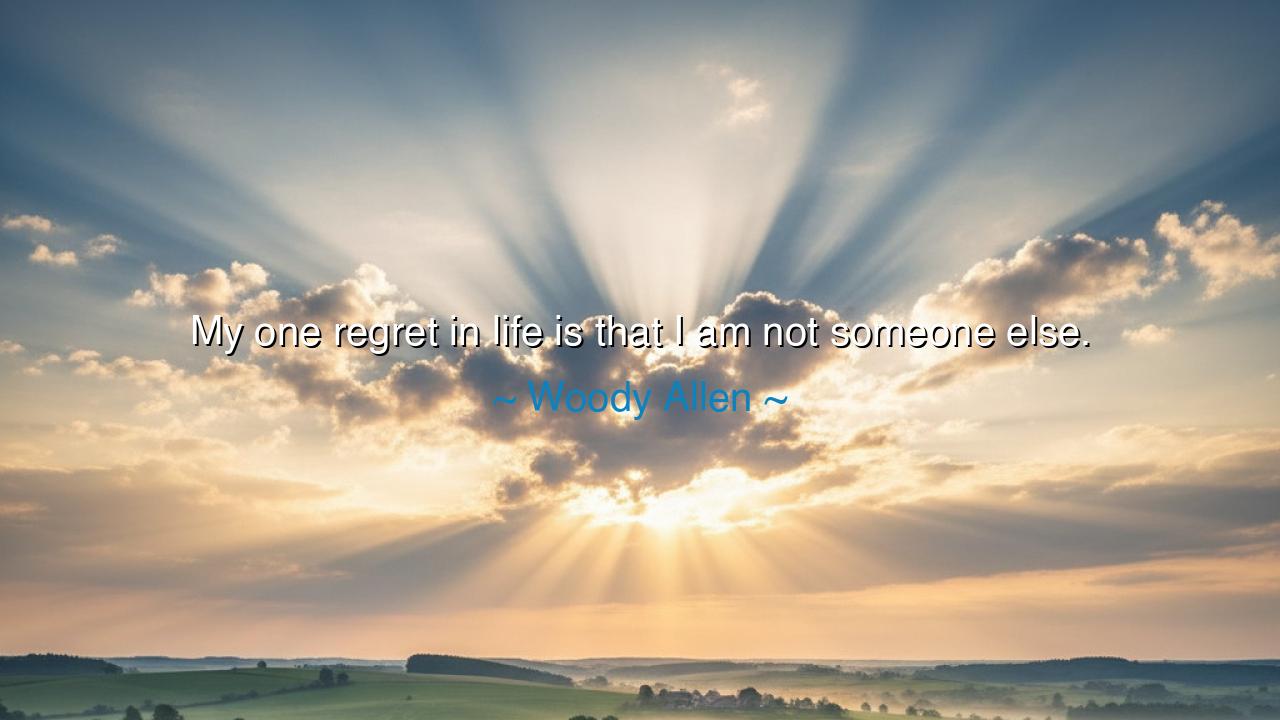
My one regret in life is that I am not someone else.






"My one regret in life is that I am not someone else." These words spoken by Woody Allen reflect a deep and often painful truth about the human condition. In a world where identity is often shaped by external factors—by expectations, society, and comparison—the desire to become someone else can be an alluring but ultimately hollow pursuit. Allen’s words express the universal feeling of dissatisfaction and self-doubt, a yearning to escape the constraints of one’s own life and become something else, someone more idealized or fulfilled. It is a lament that echoes through time, one that connects us to the ancients who too wrestled with the idea of identity and self-worth.
In the ancient world, philosophers like Socrates and Plato grappled with the concept of self and how it relates to the ideal. Socrates famously declared, "Know thyself," urging individuals to seek true understanding through introspection and self-reflection. For him, the path to wisdom lay not in becoming someone else, but in understanding one’s true nature and purpose. He believed that each person’s life had inherent value, and the pursuit of self-knowledge was the key to finding contentment. In contrast to Woody Allen's lament, Socrates might argue that regret arises from ignorance of one's own unique qualities, and that true happiness lies in accepting oneself for what one truly is, not in desiring to be someone else.
Consider the story of Achilles, the great hero of the Iliad. Achilles, in his greatness, yearned for glory and fame, desiring a legacy that would outshine all others. But in the end, Achilles’ pride and obsession with his own image led him to tragic decisions, including the fateful choice to enter a war that would claim his life. Achilles’ story reflects the danger of seeking to be someone else—to project oneself into an idealized vision, forsaking the realities of one’s true self. Homer portrayed Achilles as a hero, but also as a man who could never fully embrace his humanity, caught in the trap of comparison and a longing to be something beyond himself. In this way, Allen's lament may be seen as a modern echo of Achilles' tragic flaw: the belief that being someone else might somehow bring fulfillment.
In modern times, Allen’s quote resonates deeply with the struggles of identity in an age of social media, celebrity culture, and the constant comparison to others. The rise of the internet has only intensified the desire to become someone else, to mold oneself after the idealized images that we see in advertisements, movies, and the lives of others. Just as Achilles desired eternal glory, modern individuals often find themselves chasing after external markers of success and happiness. Facebook, Instagram, and other platforms have created a world where people present curated versions of their lives, leading others to feel dissatisfied with their own reality. In this digital age, Allen’s regret resonates as a reflection of our collective tendency to look outward and compare, rather than turn inward to accept and appreciate who we are.
The lesson embedded in Allen’s words is one of self-acceptance and self-compassion. Regret often stems from a failure to recognize the beauty and worth of our own unique experiences, abilities, and identity. The challenge, as Socrates taught, is not to wish to be someone else, but to know ourselves fully, to understand the depth of our own character, and to embrace our imperfections as part of the whole. It is a call to celebrate what makes us individual, rather than trying to emulate someone else’s life. In accepting ourselves, we find the freedom to pursue a life of our own design, without the heavy burden of comparison.
In practical terms, this means that we must learn to appreciate our own journeys, our own stories. It is natural to look to others for inspiration, but we must not lose sight of the fact that our experiences are uniquely our own. As we navigate the complexities of life, it is essential to remember that the pursuit of happiness and fulfillment begins with self-awareness and self-compassion, not with the desire to become someone else. Gratitude for the gifts we have, and acceptance of our flaws, can help to cultivate a life of purpose and contentment.
In the end, Allen’s words serve as a reminder of the futility of comparison. The path to true fulfillment is not found in desiring someone else’s life, but in embracing our own. Just as Plato taught that the soul’s journey lies in its ability to understand itself, so too must we understand that growth and contentment come from the acceptance of our own path. Let us reject the desire to be someone else, and instead seek the wisdom and peace that comes from living authentically, in harmony with our own unique nature. In doing so, we will discover that regret has no place in a life well-lived.






AAdministratorAdministrator
Welcome, honored guests. Please leave a comment, we will respond soon